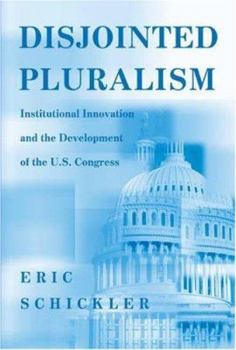Disjointed Pluralism: Institutional Innovation and the Development of the U.S. Congress
(Part of the Princeton Studies in American Politics: Historical, International, and Comparative Perspectives Series)
Select Format
Select Condition 
Book Overview
From the 1910 overthrow of "Czar" Joseph Cannon to the reforms enacted when Republicans took over the House in 1995, institutional change within the U.S. Congress has been both a product and a shaper of congressional politics. For several decades, scholars have explained this process in terms of a particular collective interest shared by members, be it partisanship, reelection worries, or policy motivations. Eric Schickler makes the case that it...
Format:Paperback
Language:English
ISBN:0691049262
ISBN13:9780691049267
Release Date:May 2001
Publisher:Princeton University Press
Length:376 Pages
Weight:1.20 lbs.
Dimensions:0.8" x 6.1" x 9.2"
Customer Reviews
0 rating





